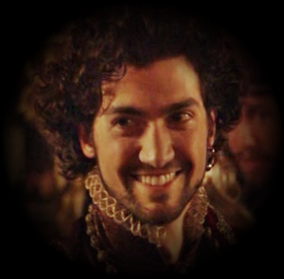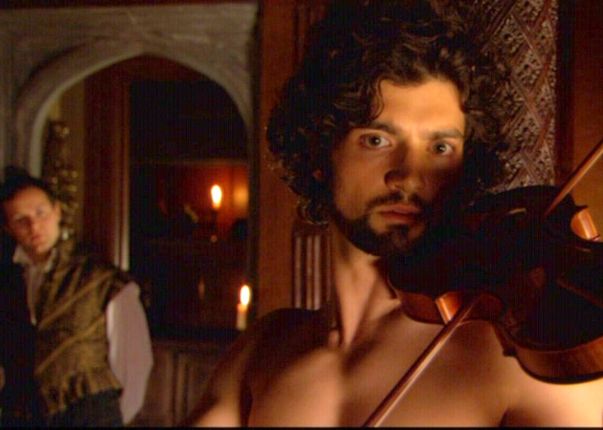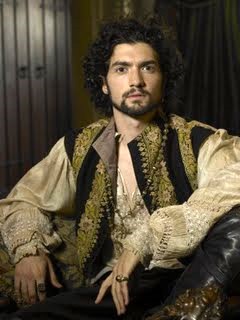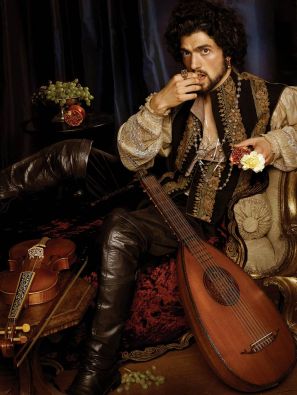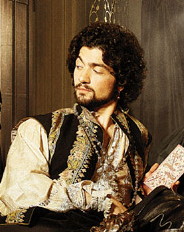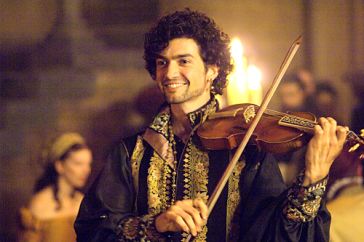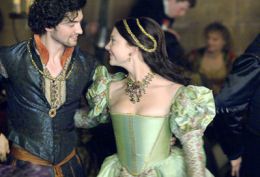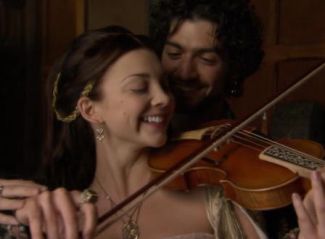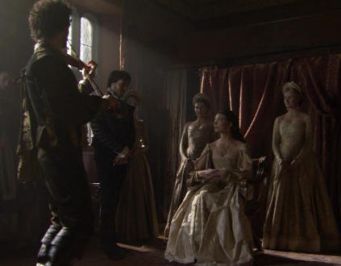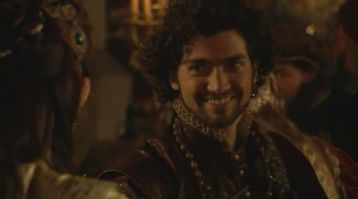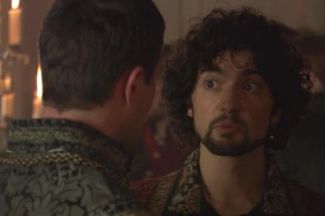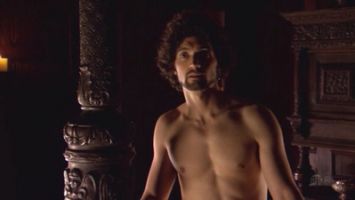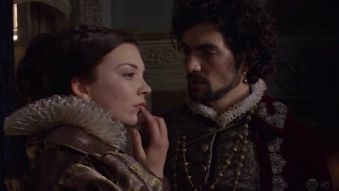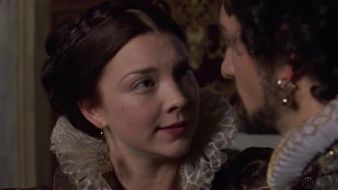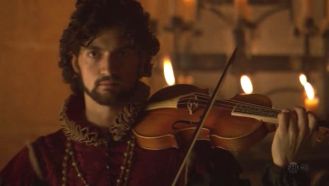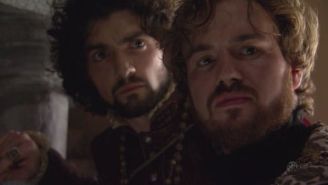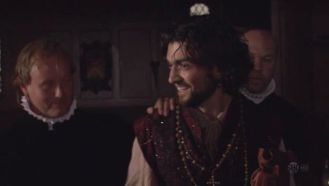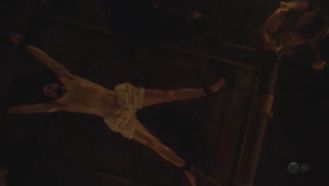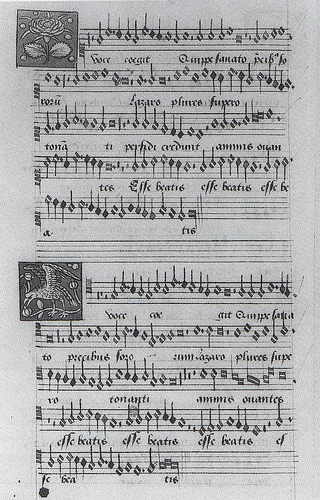Mark Smeaton
Jump to navigation
Jump to search
Mark Smeaton as played by David Alpay
UNFORGETTABLE CHARACTER QUOTES
DEFINING EPISODES | MEMORABLE SCENES
PHOTOS
Court Musician | ||
| born c. 1512 - executed May 17, 1536 by order of King Henry VIII Character's backstory: Smeaton's origins are mysterious, although it is thought that he originally came from Flanders by his Flemish last name. It is thought that his father was a carpenter, who “laboured with his hand, with the sweat of his face purchased his living.” However, it seems Smeaton was embarrassed with his working-class origins and he dropped the use of his last name and preferred to be referred to simply as ‘Mark.’The first notice of Mark was when he joined Cardinal Wolsey's choir. At some point, either when his voice broke or Wolsey fell from power, Mark transferred to the King's Chapel Royal, where he was noticed by Anne Boleyn. He was appointed Groom of the Privy Chamber in 1532. A triple threat, Mark was a talented dancer, singer, and musician. He was also said to have composed music (in the Franco-Flemish style that his patroness enjoyed since her time as a fille d'honneur at the court of Margaret of Austria), including various pieces he wrote in honor of his patroness' coronation. The compilation was said to have the image of a falcon (symbol of Anne Boleyn) violently thrashing at a pomegranate (symbol of Katherine of Aragon) with its talons. Although he was never part of the inner circle of courtiers who were personally close of Anne, his patroness rewarded his work with gifts of fine clothes and money (which wasn't atypical of Renaissance patrons). At the age of eighteen, he had received a Christmas present worth about £750 in modern currency; whilst, in preparation for a state visit to Calais in the winter of 1532, he received a bonus of £1,250 for having organised much of the musical entertainment and by 1536, he was on a salary eighteen or nineteen times higher than that of the average court musician. He dressed well and had his own horses and a few servants and he soon adopted the mannerisms of an aristocrat. Many thought he had ideas above his station, Nicolas Bourbon, a French scholar who was the tutor to the Queen’s nephew, thought Smeaton was insufferably pretentious and in his poetry, Sir Thomas Wyatt characterized him as a shameless social climber. He was one of five men accused of adultery with Anne Boleyn and charged with high treason along with George Boleyn, William Brereton, Sir Henry Norris, and Sir Francis Weston. The story that Smeaton was “grievously racked” into confessing to be the Queen’s lover is referred to in a letter in Cromwell’s collection, which makes the charge of torture almost beyond doubt. It maybe that he was promised his life if he would provide the necessary evidence to arrest the Queen and Sir Henry Norris. In any event, it maybe that he was given the swift clean death of the axe rather than the barbaric hanging. drawing and quartering which was the usual method of execution for a person of his low status. Gentility: Commoner, French-Flemish background Position: Court musician, Groom of the Privy Chamber, Music tutor to Princess Elizabeth Personality type: Moody, polite, very creative and also intelligent, thoughtful, somehow naive but also knows what he wants Signature look: Youthful and "very handsome" Endearing trait(s): Talented, Triple Threat, Kind, Polite Annoying trait(s): Prone to envy, and ambitious social climbing also said to be a bit arrogant as one result of his rapid rise, Mark "dysdayned" his low-born parents and did not have much contact with them after he entered the King's household. Musical Instruments played: Virginals, lute, spinet & organ. *the character in the series plays the violin only* | 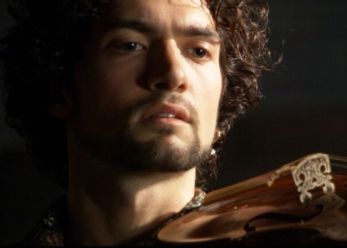
| |
CHARACTER CONNECTIONSFamily members: was said to be the son of a seamstress and a carpenter. Romance(s): Despite the series portraying Smeaton as a homosexual, there is no historical evidence of this. Historian Eric Ives says that he may have had a crush on Anne Boleyn and recounts Sir William Kingston's letter where Anne remembers a scene in her presence chamber April 29, 1536 : "Smeaton was standing in a window embrasure and noticing that the young man appeared downcast, Anne had asked why. Smeaton replied that it did not matter, at which the queen said, "You may not look to have me speak to you as I should do to a noble man, because you are an inferior person". "No , no Madam" he answered " A look sufficed me, and thus fare you well". The interchange is revealing.... [it] suggests that, though he was a skilled and valued professional, Smeaton resented being excluded as an 'inferior person' from the game of courtly love around the queen and her ladies......[and he] may have genuinely failed to distinguish between being a servant in the menial sense which he was and being a servant in a chivalric sense, which he was not. Most poignant of all is the possibility that the young man had failed to realize that courtly love and true love were a different coin." Friends: Anne Boleyn George Boleyn Thomas Wyatt (the Elder) Mary Boleyn Enemies: | Arrest & Execution: On April 30, 1536, Mark Smeaton became entangled in the plot to incriminate Queen Anne and remove her from the throne. On that day he was lured away from the protection of the court, arrested, and taken to Cromwell's residence at Stepney. Since Smeaton was a commoner, it is highly probable that he was tortured into granting a false confession - that he slept with the queen and would name others who visited her bed. He confessed that Henry Norris and George Boleyn were guilty of adultery with the queen and conspiracy to murder King Henry. On May 2nd, Anne was arrested and taken by boat to the Tower of London. On May 4th, Francis Weston and William Brereton would join her. Thomas Wyatt was arrested on May 8th and imprisoned in the Tower, but later released for lack of evidence he was part of the conspiracy. The four men, Smeaton, Norris, Brereton, and Weston, were tried in Westminster Hall and found guilty May 12th. During the trial, Smeaton was found guilty on evidence that he admitted that he was in love with the queen and she had given him money. In retrospect, if Smeaton was in love with Anne, there is no evidence that she returned his affection much less had sex with him. The four men were sentenced to be hung, cut down while alive, disemboweled, castrated, and finally quartered. Anne and George were tried on May 15th, their sentence was to be burned or beheaded at the King's pleasure (he chose beheading). On May 17, the five men were executed on Tower Hill. Smeaton's last words were an apology for his "misdoings". As Smeaton was led to his execution, he stumbled back from the bloody scaffold. Collecting himself, he said despairingly, "Masters, I pray you all pray for me, for I have deserved the death." Smeaton was granted the "mercy" of a beheading, rather than the usual brutal quartering assigned to commoners. This is thought to have been due to his co-operation with Anne's enemies. The other four men were also beheaded. Smeaton's body was buried in a common grave with another accused adulterer with the queen, William Brereton. |
UNFORGETTABLE CHARACTER QUOTES
|
DEFINING EPISODES | MEMORABLE SCENES
|
PHOTOS
| | |
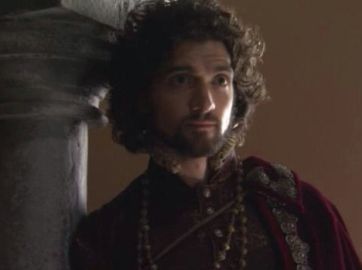 | |
| Mark Smeaton and his patroness, Anne Boleyn | |
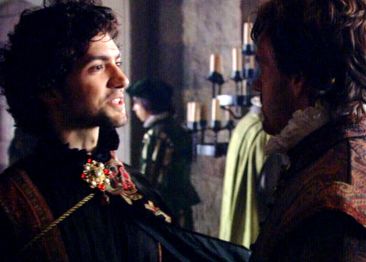 | 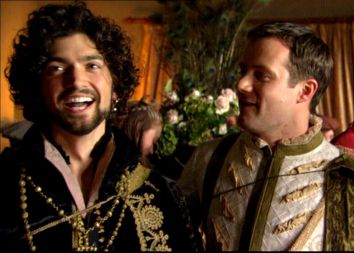 |
| | 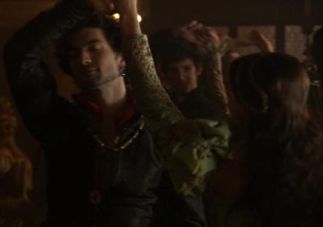 |
| | |
| Mark makes flirtatious overtures to George Boleyn | |
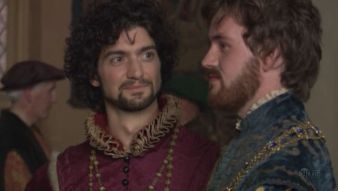 | 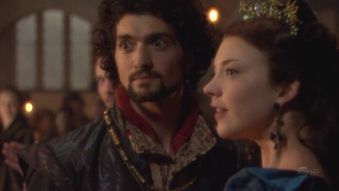 |
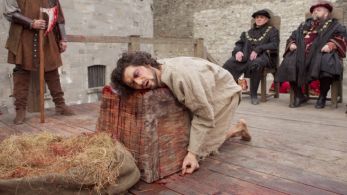 | 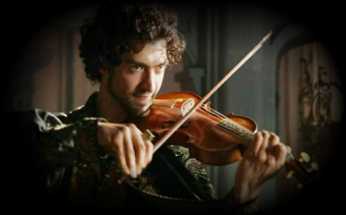 |
| <embed height="282" src="http://widget.wetpaintserv.us/wiki/thetudorswiki/page/Mark+Smeaton/widget/youtubevideo/1685255955" type="application/x-shockwave-flash" width="343" wmode="transparent"/> | A collection of thirty-nine old-fashioned Latin motets and five French chansons of the Franco-Flemish school which was complied for Anne Boleyn. This page is the fourth in the work and depicts the Boleyn falcon peeking at a pomegranate (the badge of Katherine of Aragon). Perhaps the book was composed for her coronation festivities in May-June 1533. However it was later altered as a reference to her execution can be found on page 157. It has been suggested that the manuscript was complied by Mark Smeaton a musician of the king’s Privy Chamber. |
